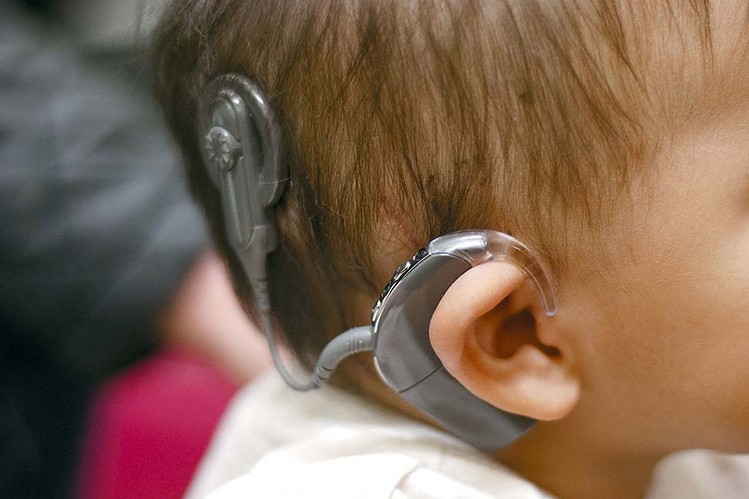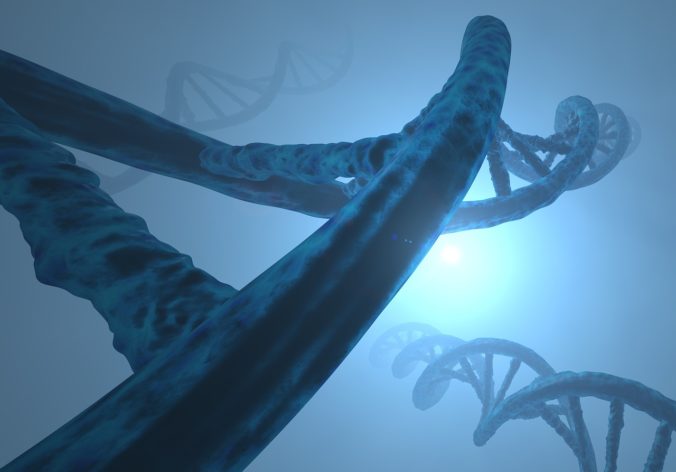Hereditary hearing loss is caused by genetic mutations and is present at birth. In this article, we explain the different types of hereditary hearing loss, how many people are affected by this disorder, and how it can be diagnosed and treated.
What is hereditary hearing loss?
Hereditary hearing loss or congenital deafness is present at birth. As it appears before speech develops, it is also known as prelingual deafness. This type of hearing loss can be partial or total, unilateral or bilateral.
According to the Spanish Society of Otorhinolaryngology and Head and Neck Surgery (SEORL-CCC), approximately 80% of new cases of deafness or hearing loss that are diagnosed in developed countries are of genetic origin: genetics may play a direct role in the disorder, or it may have been the result of hereditary predisposition.

Dr. Rubén Cabanillas and Dr. Juan Cadiñanos confirm that at least 60% of cases of neonatal sensorineural hearing loss are caused by genetic factors. Approximately 60% of early-onset hearing loss is also believed to be due to genetic causes. The remaining 40% of cases are due to environmental factors, such as pre- or postnatal infections, foetal distress, hyperbilirubinemia or exposure to ototoxic drugs.
Types of hereditary hearing loss
Hereditary hearing loss can be classified in two main categories:
- Syndromic hearing loss (SHL): this is associated with deformities in the auditory canal or other organs, or with medical issues that affect other systems of the organism.
- Non-syndromic hearing loss (NSHL): this is not associated with any visible deformities in the ear canal or with any other medical issues. However, it may be caused by deformities in the middle or inner ear, and is the most common type of hereditary hearing loss, accounting for somewhere in the region of 70% of cases.
Diagnosing hereditary hearing loss
The Acta Otorrinolaringológica Española (the publication by the Spanish Society of Otorhinolaryngology) confirms that carrying out an etiological diagnosis of sensorineural hearing loss that may be genetic in origin is a complex process as there is no standardized protocol. Furthermore, today it can difficult to establish a clear distinction between environmental and genetic hearing loss.
In order to diagnose hereditary hearing loss, the specialist needs detailed information on the patient’s personal and family background and will carry out an exhaustive physical examination. If necessary, they will also request additional radiological, biochemical and/or genetic tests.
Treating hereditary hearing loss
Newborns require personalised treatment to guarantee the best possible cognitive and linguistic development. The treatment’s success will depend on the cause and severity of the hearing loss.
Ideally, the baby should be treated by a team of medical specialists, formed by paediatricians, ENT specialists, language and hearing specialists and therapists, who will work closely with the parents to create a tailored treatment plan that covers the specific needs in every case and can be adapted as the child grows.

Photo credit: diversified hearing
Treatment for hereditary hearing loss may include:
- Cleaning of the ear canal: it is important to remove any wax or dirt from the ear and treat any underlying infections.
- Early stimulation: this helps to develop and strengthen the child’s social communication and involvement, preventing overprotective behaviour and/or rejection.
- Using hearing aids or cochlear implants: this can commence once the medical team has established the child’s hearing threshold.
- Re-education: the child may be taught sign language and lip reading.
- Surgery: surgery may be able to correct structural problems or damage to the eardrum or ossicles with the use of prosthetics or medication.
If you have any questions on hereditary hearing loss or would like to provide any additional information on the subject, please feel free to contact us by leaving a comment under this article.

Leave a Reply